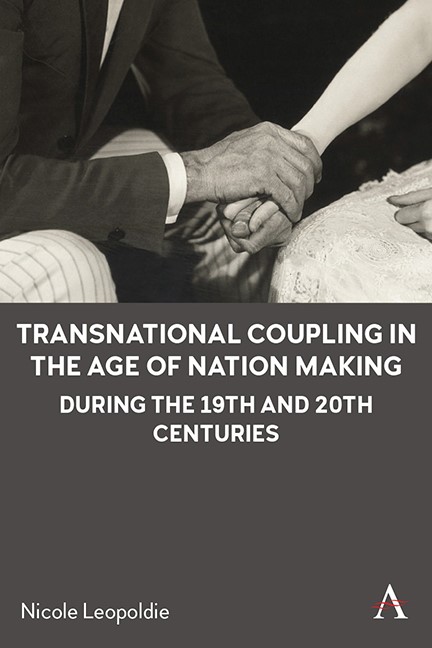Book contents
- Frontmatter
- Contents
- List of Figures
- Acknowledgements
- Introduction Marriage: National Borders and Personal Spaces
- Part I “Trading Titles for Treasure?”: Elite Marriages during the Nineteenth Century
- Part II “Paris is Free—and So Are Its Kisses”: Wartime Marriages during the Twentieth Century
- Conclusion
- Bibliography
- Index
- Frontmatter
- Contents
- List of Figures
- Acknowledgements
- Introduction Marriage: National Borders and Personal Spaces
- Part I “Trading Titles for Treasure?”: Elite Marriages during the Nineteenth Century
- Part II “Paris is Free—and So Are Its Kisses”: Wartime Marriages during the Twentieth Century
- Conclusion
- Bibliography
- Index
Summary
History written within the framework of the nation is as distorted as it is incomplete. From these caged perspectives, instances of transnational coupling and marriage were too often treated as curious anomalies that violated norms and could only be explained by the economic motives of the participants. The marriages examined here however were deeply embedded in a profound cultural relationship between these two societies. Of course, these subjects were only a small subset of a larger population that occupied the Atlantic space, but by carving out these small moments in the past, and examining them through cultural and emotional lens, a more fruitful historical perspective of recent discussions about the nature of transnational cultures and the definitions of marriage and family formation emerges.
This book has provided an examination of two different patterns of Franco-American marriage that occurred in two very different historical contexts. In the nineteenth century, transnational marriages between France and the United States largely occurred between wealthy, elite Americans and those that they perceived to be their socio-economic equivalent—European aristocrats. Linked within same social networks, these elite transnationalmarriage participants often spoke the same languages, shared common values, read similar literature, and performed similar cultural rituals. This paired with their unrestricted movement between different urban centers such as New York, London, and Paris meant that their marital unions often emerged out of spaces that were not entirely defined by national boundaries. The coming of World War I then effectively ended elite domination of the transnational space that existed between France and the United States and allowed for a geographic mobility of the working, rural, and middle classes who engaged in the conflict. By bringing an entire new group of people into the sphere of transnationality, World War I and its consequences changed not only the power relations between France and the United States but also the dimensions of broader cultural encounters and social spaces that existed between the two. In this context, wartime-marriage participants were not members of a socially homogenized, transnational social network that effortlessly carved out an existence and moved freely beyond national boundaries as their nineteenth-century counterparts had but were instead American soldiers and local French women who were largely restricted by both the conflict around them and the national boundaries that were tangibly manifested in their everyday lives.
- Type
- Chapter
- Information
- Transnational Coupling in the Age of Nation Making during the 19th and 20th Centuries , pp. 141 - 146Publisher: Anthem PressPrint publication year: 2023



